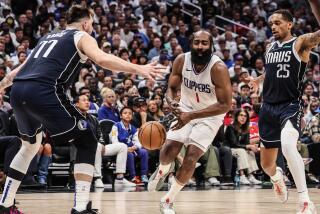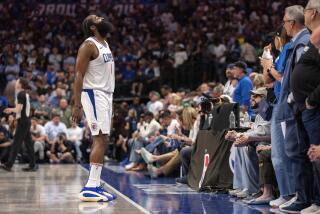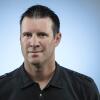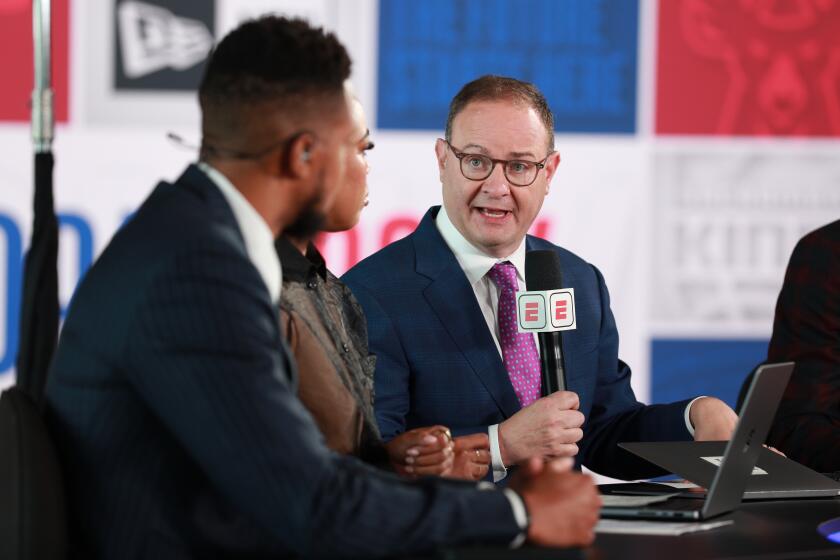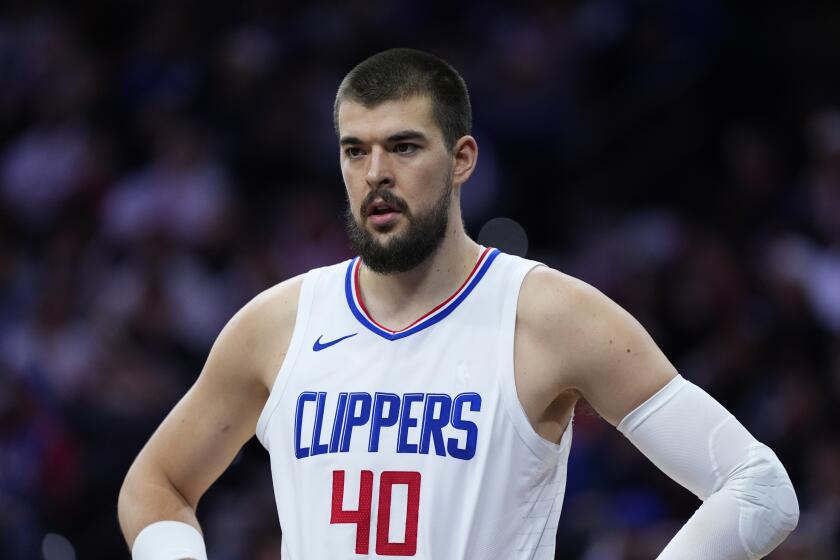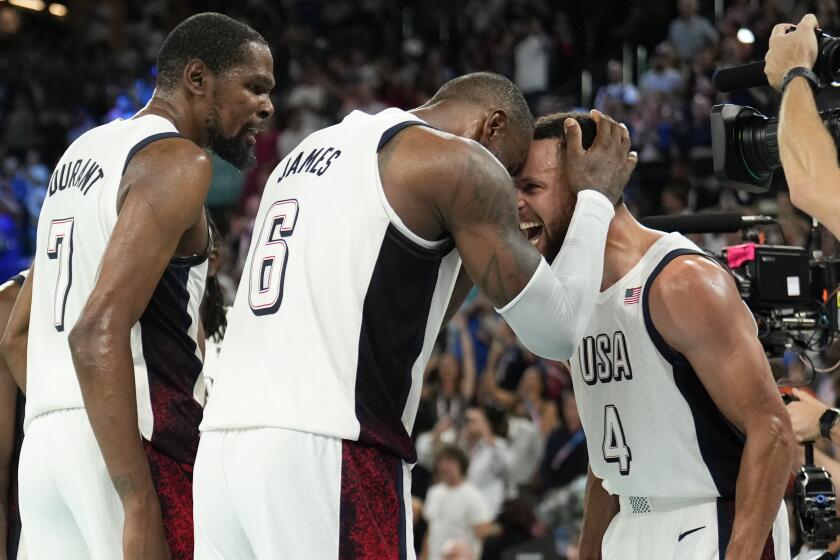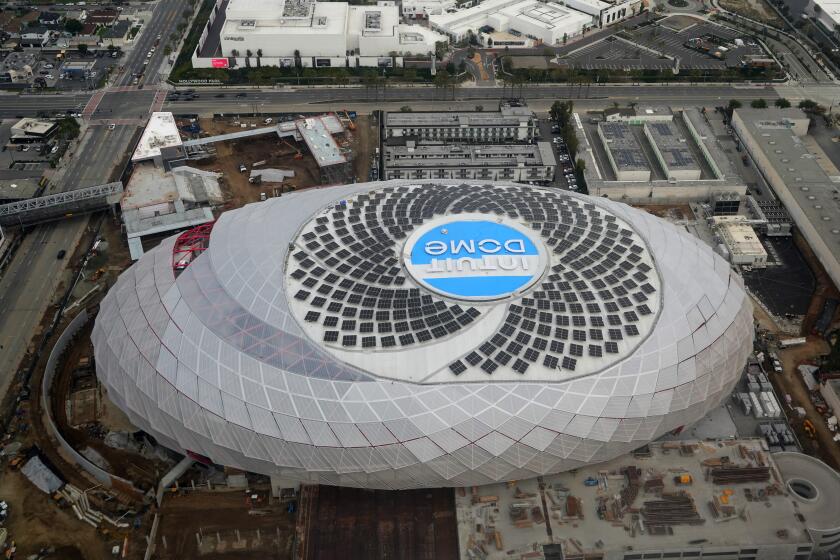Rockets’ intentional fouls slowing down games, but not the Clippers
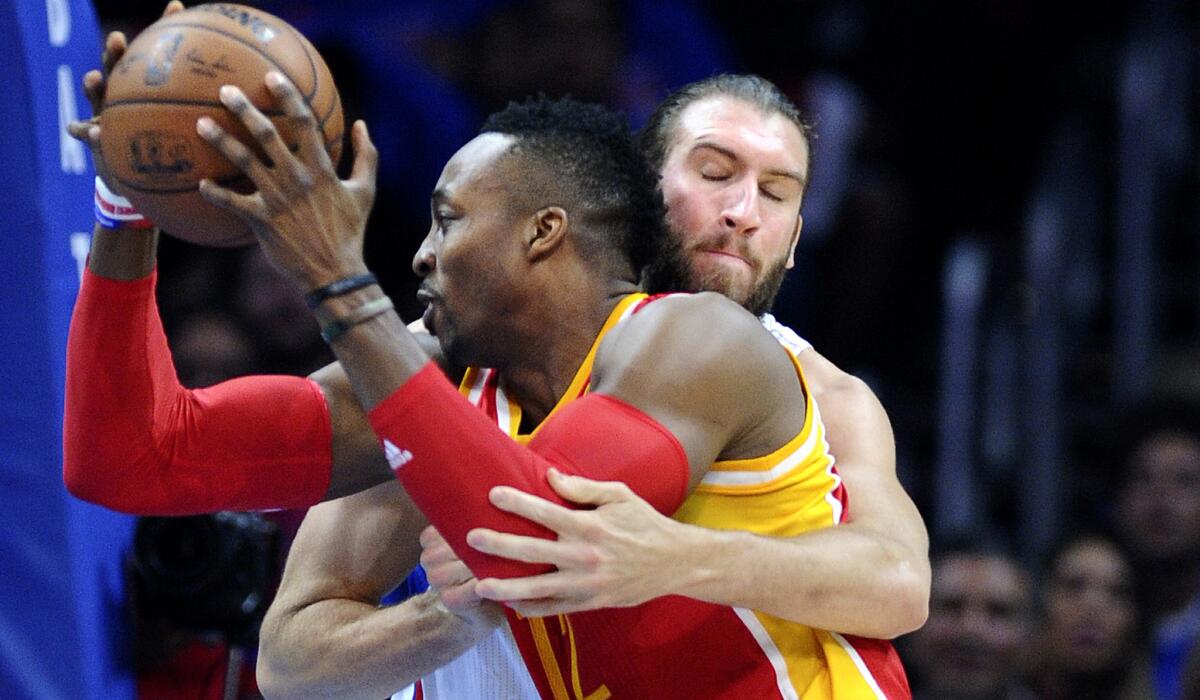
Clippers center
It’s become an in-game ritual involving Clippers Coach Doc Rivers, taking place after a player is fouled intentionally away from the ball.
“Every ref, every game it starts, he looks over at me and says, ‘You guys have to stop this,’” Rivers said recently.
Rivers is on the NBA’s competition committee, which will soon take a hard look at the concept of fouling a player on purpose to force him to shoot free throws.
One of Rivers’ players, center DeAndre Jordan, set an NBA playoff record Sunday by attempting 28 first-half free throws against the Houston Rockets, an overwhelming majority of which were awarded to Jordan by design.
The Rockets often fouled him before he even got to midcourt, forcing the weak free-throw shooter to go to the line instead of allowing the Clippers to run their potent offense.
It distorted the flow of the game, reducing it to a lot of missed free throws (18 by Jordan in the first half alone), and it didn’t even help the Rockets, who trailed by six at halftime of the Clippers’ 128-95 blowout victory.
It bored basketball fans watching on TV and irritated Clippers followers in attendance at Staples Center. What to do? Depends on who you ask.
There’s a split line on whether to ban the act of fouling a player on purpose away from the ball. The NBA took steps decades ago to stop the practice in the final two minutes of a game, awarding the fouled team the ball out of bounds after the player took his two free-throw attempts.
But that still leaves 46 minutes of game time. Long, tedious game time Sunday. The first half dragged on for 84 minutes.
Clippers teammate Blake Griffin called it all “crazy” and Rockets All-Star guard James Harden said he personally disliked the concept.
Houston Coach Kevin McHale said he made his players do it to “muck up” the game after All-Star center Dwight Howard got in early foul trouble, taking away one of the Rockets’ top offensive threats.
Yet the strategy hurt Houston’s offense. Jordan had trouble making free throws, but the Rockets never found the precision that made them one of the NBA’s top-scoring teams in the regular season.
They inserted less-experienced personnel to foul Jordan, and it directly backfired when rookie Clint Capela missed an open layup. When Capela picked up a slew of fouls, all intentional, the Rockets put offensively challenged Joey Dorsey into the game to continue the free-throw party.
“That was awful to watch, and I feel for the fans,” TNT analyst Charles Barkley said.
Traditionalists, though, think nothing should be changed.
“Why would they outlaw the fact that you’re taking advantage of a guy’s shortcomings?” said Hall of Famer Rick Barry, who led the NBA and ABA in free-throw accuracy eight times. “Isn’t it up to the guy to get better so a team can’t do that to him? That’s crazy.
“That’s like having a bad defensive back in football and let’s not throw to our guy so we can eat his lunch because he’s not that good. I mean, seriously. As a coach, you have to try to take advantage of everything you can possibly do. If you have someone you can take advantage of, take advantage of it.”
Clippers All-Star point guard Chris Paul is Jordan’s friend and teammate. He acknowledged continually trying to prop up Jordan, a 39.7% free-throw shooter in the regular season, during the first half Sunday.
But rules are rules. Paul understands the premise of on-court exploitation if it means winning a game.
“Should they ban it?” Paul said. “No. It’s part of the game.”
But it’s part of a boring game.
Major League Baseball has taken steps to speed up play, including a new rule forcing hitters to keep at least one foot in the batter’s box to prevent elaborate, time-consuming walk-abouts between pitches.
The NFL has tried to shorten its replay review time over the years to keep games from too much disruption.
Maybe it’s the NBA’s turn to examine another way to keep its product fresh.
NBA general managers are gathering for a scheduled meeting Wednesday, where the topic will almost certainly be discussed informally.
A more significant meeting will be that of the league’s competition committee during the NBA Finals next month and again in July or August. At either of those, the committee could make a recommendation to the NBA’s board of governors, who would then vote on a rule change at their gatherings in July or October.
One possibility would make intentional away-from-the-ball fouls illegal during the whole game, not just the last two minutes.
Another possibility is assessing a technical foul on the team committing an intentional foul. The team whose player is fouled would get a free throw and retain possession.
Or, the coach of the fouled team could be given the option of accepting the two free throws or having his team take the ball out of bounds.
Jordan’s 28 first-half attempts broke the mark Shaquille O’Neal set with the Lakers when Portland sent him to the line 27 times in the second half of a 2000 playoff game.
O’Neal, a career 52.7% free-throw shooter, always claimed he would make his free throws when necessary, and he did in that game, including seven in a row in the Lakers’ 109-94 victory.
The concept became known as “Hack-a-Shaq,” though it actually dated to the days when Wilt Chamberlain was sometimes fouled intentionally because of his 51.1% career free-throw accuracy.
O’Neal, now a TNT analyst, sneered Sunday when discussing his record-setting game in the 2000 Western Conference finals.
“That’s because the team I was playing was soft and they feared me so they fouled me. It didn’t work,” he said. “Just like it ain’t working now. The Clippers are up.”
In the regular season since 2013, the Clippers are 12-0 when Jordan shoots 14 or more free throws, 16-3 when he shoots 12 or more and 25-6 when he shoots 10 or more. Bottom line: the strategy really doesn’t work.
The Clippers have a 3-1 series lead against the Rockets, needing one victory to advance to the conference finals for the first time in their 45-year history.
Maybe that will be the bigger story Tuesday in Game 5 at Houston. Or maybe Jordan will go to the line again and again, missing a double-digit number of free throws in another way-too-long game.
Twitter: Mike_Bresnahan
Twitter: latbbolch
More to Read
Get our high school sports newsletter
Prep Rally is devoted to the SoCal high school sports experience, bringing you scores, stories and a behind-the-scenes look at what makes prep sports so popular.
You may occasionally receive promotional content from the Los Angeles Times.

